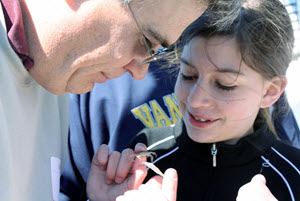
Alan and Anissa Holekamp enjoyed looking at a juvenile blue crab that was caught in the trawl aboard the R/V Acadiana during Dads and Daughters Day. (Photo by Murt Conover)
“My mom would love this boat ride.” “I wish my child could walk the marshes.”
Murt Conover, Senior Marine Educator and Aquarist with the Coastal Waters Consortium (CWC), often hears comments like these when leading teacher and student groups at the Louisiana Universities Marine Consortium (LUMCON) facility. She thought it seemed like a “no brainer” to put parents and kids together in outreach programs, and thus the inaugural Father/Daughter and Mother/Son Discovering Coastal Waters Science events were born.
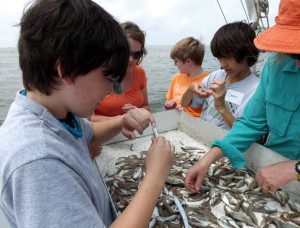
Mothers and sons identified, sorted, and counted the species caught in a trawl in Terrebonne Bay aboard the R/V Acadiana. (Photo by Murt Conover)
Conover loves planning educational activities that get local families outside in the marshes and waterways to learn about the delicate ecosystem that surrounds them. They also learn about impacts from natural and manmade hazards that affect this region, one being the Deepwater Horizon oil spill. She explains, “We like to get people to experience it first hand, because ownership leads to responsibility. We have a very ‘get your feet wet and hands muddy’ philosophy as far as education goes!” But the events are not just pretty nature walks. Participants often gather samples and analyze them in the LUMCON lab using state-of-the-art research technology. “We do the scientific process from start to finish,” Conover says proudly.
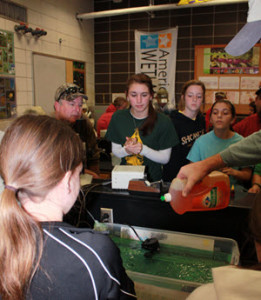
Groups of dads and daughters conducted experiments to learn about how oil can behave in currents before and after it has been dispersed. (Photo by Murt Conover)
Earlier this year, close to Valentine’s Day, CWC hosted a Dads and Daughters Day. They began with a ride on the R/V Acadiana to see the beauty of the Louisiana coast and to experience the kinds of tasks scientists perform on a research vessel. That afternoon, the group conducted oil-spill related experiments in the lab. After the experiments, they finished the day learning about marsh habitat.
CWC hosted a Mothers and Sons Day in May in honor of Mother’s Day. This event was similar to the Dads and Daughters Day, but because of the warmer weather, they constructed Remotely Operated Vehicles (ROVs) and tested them outside. Both the moms and the sons enjoyed working with this research technology and being out in the field. One son said, “We walked into the marsh. That was a first for me. We saw little house-like areas made of sticks.” He added, “I’m glad to see the oil spill didn’t kill all of the animals.”
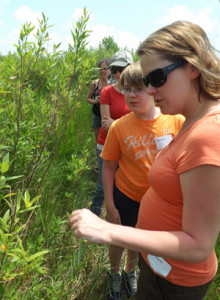
Mother Shawn Duplessis and her son Brady learned the names of the vegetation found on a natural ridge in the salt marsh. (Photo by Murt Conover)
One of the main goals of these programs was to acquaint locals with current research being done to learn about the environmental response to the oil spill, and participants’ feedback showed success. One mom gave this family outreach event the perfect review, commenting, “I wasn’t aware of the structure in place for studying oil spill impacts. It is comforting to realize that compassionate and competent people are researching independently, because without the independent research, it would be hard to trust the data provided to the public.”
Conover enjoyed watching the father/daughter and mother/son dynamics as they learned about the coastal environment. And since her own father came to support her efforts, the father/daughter event was even more special. She laughs, “Having my dad there that day, I got the same kind of experience as the other girls. It was fun to be the educator and the daughter.”
Both inaugural events had full attendance and participants and staff were pleased with these learning experiences. The CWC plans to host similar family-themed events in the coming months.
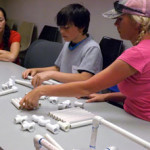
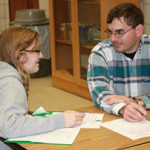
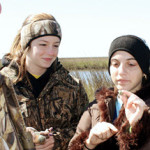
This research was made possible in part by a grant from BP/The Gulf of Mexico Research Initiative (GoMRI) with the Coastal Waters Consortium. The GoMRI is a 10-year, $500 million independent research program established by an agreement between BP and the Gulf of Mexico Alliance to study the effects of the Deepwater Horizon incident and the potential associated impact of this and similar incidents on the environment and public health.
